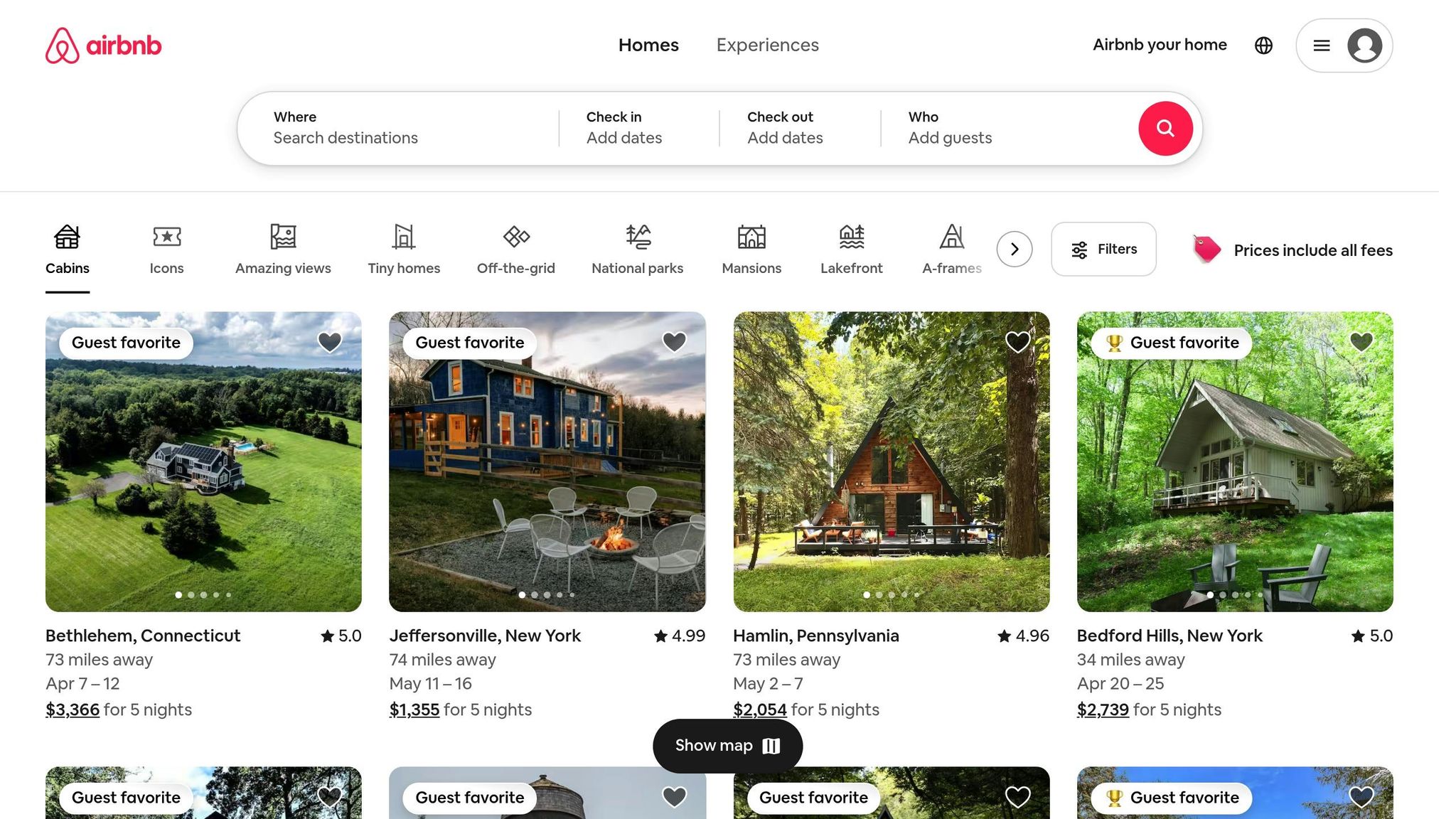
Want to make money on Airbnb without owning property? In 2025, strategies like rental arbitrage, co-hosting, and property management make it possible to generate income with minimal upfront investment. Here’s how you can get started:
- Rental Arbitrage: Lease properties long-term, then list them for short-term rentals on platforms like Airbnb. Key steps include securing landlord approval, proper insurance, and compliance with local laws.
- Co-Hosting: Manage Airbnb listings for property owners and earn 10%-25% of booking revenue by handling guest communication, cleaning, and pricing.
- Property Management: Offer full-service management for multiple properties, earning 25%-45% of booking revenue by optimizing listings, managing maintenance, and pricing dynamically.
Why now?
- Rising demand for eco-friendly and unique stays.
- Rural properties are outperforming urban ones with a 20% revenue boost.
- Advanced tools simplify operations, from automated guest communication to dynamic pricing.
Quick Tips for Success:
- Focus on rural or eco-conscious properties to attract more bookings.
- Use flexible cancellation policies to increase bookings by up to 20%.
- Stay compliant with local laws and permits to avoid legal issues.
- Leverage tools for pricing, guest management, and operations.
Ready to start? Whether you choose rental arbitrage, co-hosting, or property management, success comes down to planning, understanding market trends, and delivering what guests want.
Does Rental Arbitrage Work in 2024? (Tips & Mistakes to Avoid!)
No-Property Airbnb Business Models

You don’t need to own property to make money on Airbnb. Options like rental arbitrage, co-hosting, and property management let you earn income with minimal upfront investment.
How Rental Arbitrage Works
Rental arbitrage is about leasing a property long-term and then listing it for short-term stays on platforms like Airbnb or Vrbo.
"Rental arbitrage is a business model where an individual or entity rents a property long-term and then re-rents or sublets that property on a short-term basis on booking platforms like Airbnb or Vrbo." - Darren Pettyjohn, Co-Founder, Proper Insurance
To succeed with rental arbitrage, you’ll need:
- The property owner's approval
- Proper insurance coverage
- Compliance with local regulations
- A solid plan to ensure short-term rental income exceeds lease costs
Co-Hosting Basics
Co-hosting means taking care of a property owner's Airbnb listing and handling guest interactions in exchange for a fee. This fee usually ranges from 10% for basic tasks to 25% for full-service management.
"Having a Co‑Host can make hosting less demanding and more rewarding. They could be a neighbor, family member, friend, or someone you hire. Co‑Hosts can help you manage your calendar, update your listing, and respond to guests." - Airbnb
Co-host responsibilities typically include:
- Managing the listing and pricing
- Communicating with guests
- Organizing cleaning services
- Handling maintenance issues
- Writing reviews for guests
Property Management Services
Full-service property management takes things a step further. Here, you manage multiple properties for owners and provide end-to-end services.
Management fees usually fall between 25% and 45% of the booking revenue. Services often include:
- Professional listing setup and optimization
- Adjusting pricing based on demand
- Screening guests and managing communication
- On-site property management
- Overseeing property maintenance
The key to success is building strong service relationships and setting up systems that can grow with your business. Pick the model that aligns with your skills and market conditions to expand your Airbnb operation.
Starting Your Airbnb Business
Market Research Steps
Understanding the market is key to finding profitable opportunities in Airbnb's shifting landscape. In 2024, global Airbnb listings grew by 15%, with rural properties seeing a 20% revenue boost compared to urban ones.
Here’s how to approach market research effectively:
-
Analyze Market Performance
Look into essential metrics for your target area, such as:- Average occupancy rates (currently around 60% globally)
- Seasonal demand patterns
- Nightly pricing trends
- The level of local competition
-
Evaluate Location Potential
Focus on areas showing growth, like:- Suburban properties near major cities
- Unique rural destinations
- Cities with favorable short-term rental regulations
-
Review Legal Requirements
Stay compliant by understanding:- Short-term rental permits
- Occupancy limits
- Local tax rules
- Zoning laws
Once you've gathered this data, you’ll be ready to pursue property partnerships.
Getting Properties to List
Use your research to identify property owners who might be interested in partnering. Present a well-thought-out proposal that explains the benefits, legal responsibilities, and profit-sharing arrangements. Let your market insights guide both property selection and negotiation, ensuring the properties align with the demand you've identified.
Setting Up and Managing Listings
Properties that highlight eco-friendly features are attracting more attention, according to recent trends. To make your listings stand out:
-
Craft Engaging Content
- Emphasize eco-friendly amenities and unique property traits
- Highlight nearby attractions and experiences
-
Implement Dynamic Pricing
Adjust pricing based on:- Seasonal demand
- Local events
- Competitor rates
- Market occupancy data
-
Simplify Operations
- Automate guest communication
- Schedule regular cleanings and maintenance
- Track booking performance to identify trends
sbb-itb-08dd11e
2025 Trends and Legal Requirements
Local Rules and Permits
Running short-term rentals means following specific local regulations. Hosts and property managers need to navigate zoning laws that determine how long properties can be rented and what activities are allowed.
Here’s what you need to address:
- Check zoning laws to ensure rentals are allowed in your area
- Get necessary permits based on local requirements
- Register for state and local taxes to stay compliant
- Have liability insurance to protect yourself and your property
- Review HOA and building regulations if applicable
If you're renting while staying on-site, licensing rules can vary, so it’s a good idea to consult with a legal expert. Staying compliant with these rules not only protects your business but also builds trust with your guests.
What Guests Want in 2025
Meeting legal standards is just the start. To thrive in 2025, you need to focus on what modern travelers are looking for. As Julie Brinkman, CEO of Beyond, puts it:
"2025 belongs to those who actively listen to what travelers seek – instead of relying on historical trends or paradigms".
Here’s what’s on travelers’ wish lists:
Eco-Friendly Features
- Accommodations powered by renewable energy
- Amenities designed with sustainability in mind
Unique and Immersive Stays
- Properties in off-the-beaten-path locations
- Opportunities for local cultural experiences
- Listings with accurate and transparent descriptions
Properties highlighting eco-conscious features tend to attract more interest, and offering flexible cancellation policies can boost bookings by up to 20%. On the flip side, misrepresenting your property can erode trust, with nearly 90% of travelers saying they would lose confidence in a property if its listing turned out to be misleading.
Tools and Software to Use
Managing properties effectively in 2025 means leveraging the right tech. Look for tools that simplify operations and improve the guest experience. Key features to prioritize include:
-
Booking Management
- Automated guest communication and instant booking options
- Smart pricing tools to adjust rates dynamically
- Calendar syncing across platforms
-
Property Operations
- Digital check-in systems to streamline arrivals
- Coordination tools for maintenance and cleaning
- Smart home technologies for added convenience
-
Financial Management
- Automated tools for tax collection
- Secure payment processing systems
- Revenue and expense tracking
Platforms with AI-powered tools and automated communication can help you meet rising guest expectations while keeping your operations running smoothly.
Growing Your Airbnb Business
Adding More Properties
Expanding your Airbnb portfolio starts with smart planning and understanding the market. Look for properties in areas that attract tourists or business travelers. When approaching property owners, present a strong case by showcasing your management skills and the potential for solid returns.
Consider strategies like rental arbitrage and co-hosting to grow your portfolio. With rental arbitrage, ensure you have written approval from landlords and focus on maximizing profits through market insights. Co-hosting allows you to manage properties for others, earning a share of the income without owning the property. Both approaches can help you expand effectively when done right.
After securing new properties, fine-tune your pricing and operations to ensure strong profitability.
Increasing Profit Margins
Boosting your profits requires a mix of smart pricing, cost control, and offering the right extras. Here are some tips to help:
- Use dynamic pricing to adjust rates based on demand.
- Cut costs by automating processes and improving scheduling.
- Add premium amenities to justify charging higher rates.
Some Airbnb hosts report earning over $12,000 monthly per property through rental arbitrage.
To make these strategies work, having a solid understanding of your finances is crucial.
Using IdeaFloat for Growth

IdeaFloat offers tools that simplify financial planning for your Airbnb business. With these tools, you can:
- Create projections for new properties.
- Calculate how long it will take to break even.
- Monitor and manage expenses effectively.
- Predict revenue based on market trends.
These features help you make informed, data-driven decisions to grow your portfolio and improve profitability.
Conclusion
Starting a profitable Airbnb business without owning property in 2025 is entirely possible with careful planning and by keeping up with market trends. The key is understanding what guests want and using the right tools to meet those needs.
Focus on properties that match guest preferences. For example, rural and eco-friendly listings are seeing increased demand, with eco-conscious properties attracting more engagement and bookings. Offering flexible cancellation policies can also boost bookings by up to 20%, making them a smart addition to your business strategy.
Strong financial planning and efficient operations are essential for growth. Tools like IdeaFloat can help you make informed decisions about which properties to target, how to price them, and when to expand. Features like breakeven analysis and revenue projections ensure you're maintaining healthy profit margins as your business scales.
To succeed, prioritize eco-conscious practices, target promising rural areas, offer flexible booking options, automate processes, and comply with local laws. Whether you choose rental arbitrage, co-hosting, or property management, success lies in understanding the market and implementing efficient systems. With the right strategies and tools, you can build a thriving Airbnb business without owning property in 2025.
Related posts
Get the newest tips and tricks of starting your business!


